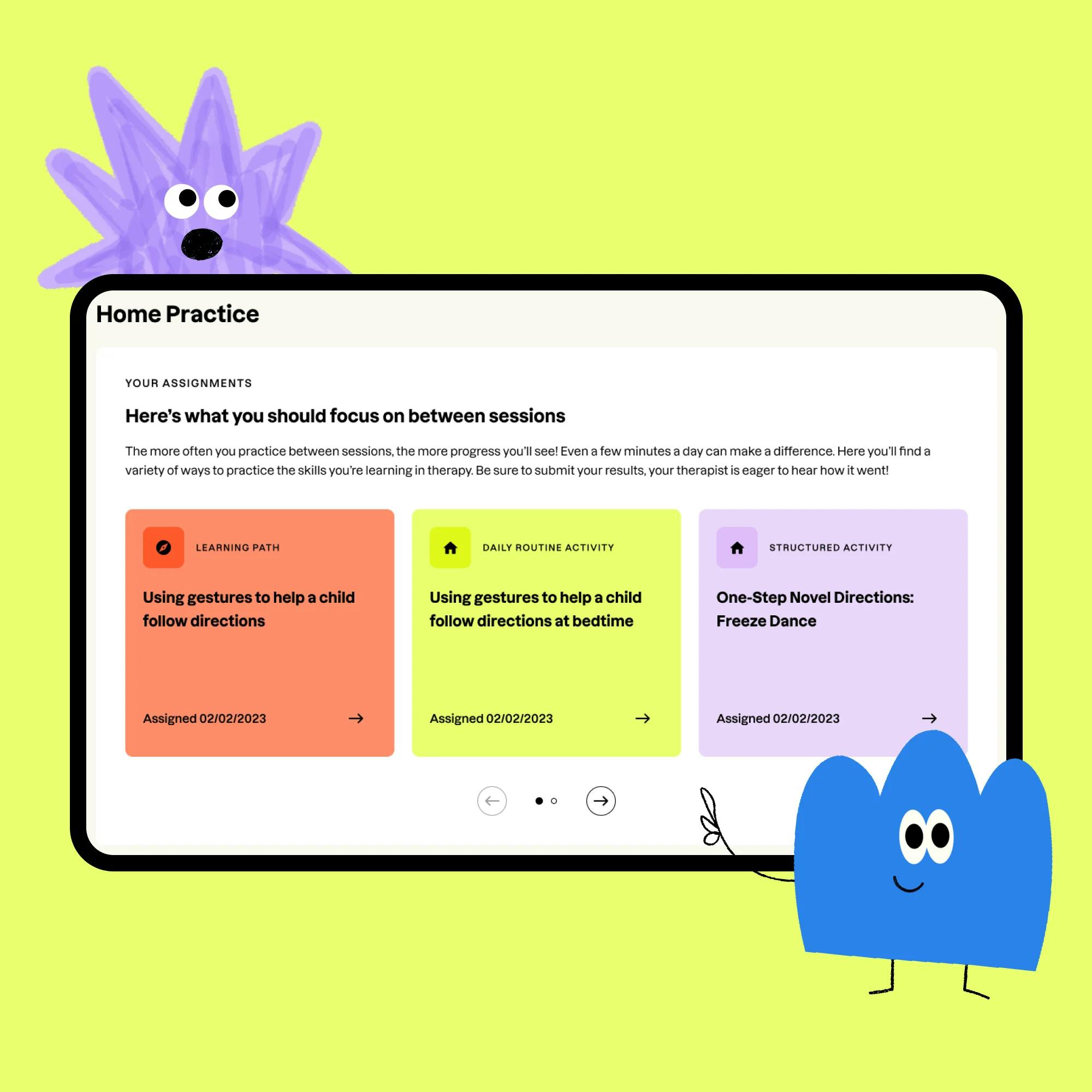The school year is in full swing, with packed schedules and busy routines. On weekdays, many families have to be up early and out the door, whether it’s to school, work, or daycare. And it may not be until after dinner that everyone’s back home together under one roof.
If your child is working on their speech and language skills, research shows that the more they practice at home, the faster they'll make progress toward their goals. But with commuting, homework, sports, appointments, and after-school activities, it can be tough to fit in practice during the week. For many families, the weekends are an easier time to focus on speech practice. So check out these fun weekend activities to help your child grow their communication skills or practice what they’re learning in speech therapy.


1. Enjoy a big breakfast
The weekend may be the only time your family gets a slow morning together. So take advantage of it! Ask your child what they’d like for breakfast. You could make waffles or pancakes together, or head to the local donut shop for a box of your favorite treats. Whatever your child chooses, there are several ways to focus on communication skills as you enjoy breakfast time together.
Practicing speech sounds
If your child is working on pronouncing certain speech sounds, find a way to practice some words that use their target sound. Let’s say your child needs help with the /l/ sound. The two of you can talk about “licking” the syrup from the spoon, or eating the “little” donuts. When you choose target words that are fun to talk about and related to what you’re doing, your child is more likely to participate. They may not even notice that they’re doing “work”!


Strengthening language skills
For children who need to work on their language abilities, here are a few ideas to try:
Practice using words, phrases, or sentences to request the food, from simply saying “more” to “May I have another donut, please?”
Describe what the food looks and tastes like with a variety of adjectives. “The bacon is crunchy!” “The juice is cold.”
Focus on using correctly structured sentences.
If cooking together, practice using sequencing words such as “First we…,” “Then we…,” “Last we….,” etc.


2. Head out to the park
Being outside in the fresh air does everyone good after a long week indoors. So take your family to your favorite park and enjoy some active time together!
Practicing speech sounds
For kids working on speech sounds, try adding that practice into the activities you’re doing. For example, if you’re playing basketball together, you can have them say a word from their practice list after every shot they take. Or, after you get home, you can talk about things you did together and give them target words to use during that conversation.
Strengthening language skills
Playing outside is an easy opportunity to encourage language growth for children who need help in this area. Try these ideas:
Practice using words, phrases, or sentences to request each activity (going up the slide, swinging, etc.).
Play a game of I Spy, describing items to your child to help them guess what you’re talking about.
Create an obstacle course and give two- or three-step directions to see how easily your child can follow them (“Go down the slide, run around the tree, then sit on the bench.”).
Practice using correct verb tenses–for example, “I am running” and “I ran.”
3. Cuddle up for a movie night
Movie night is a hit with kiddos of all ages! Pick out snacks, gather up cushions and blankets, and get cozy together.
Practicing speech sounds
Set a timer for 5 minutes and start the movie. Then, listen for words that contain your child’s target sounds. Each time you hear a word, pause the movie and have your child practice the word, or the sentence with the word–whichever level they’re currently at.
Remember, you only need to do this for a few minutes–not for the entire movie! You can try this practice technique anytime you’re watching TV or a video with your child.
Strengthening language skills
To practice receptive and expressive language skills, try the following:
Give your child two- or three-step directions to help get the living room, snacks, and anything else ready for your movie night.
Have your child explain what they think the movie will be about.
Pause the movie occasionally and ask your child to describe what they just saw. You can help them use correctly structured sentences, or focus on grammar, such as using correct vocabulary, pronouns, and verb tenses.
4. Sneak in practice between weekend activities
Lots of families have jam-packed weekend schedules, with work, sports, classes, errands, and other events. But there are still ways to sneak in speech and language practice.
Practice can be as short as 5 to 10 minutes at a time.
Keep in mind, practice doesn’t have to be anything elaborate, and it can be as short as 5 to 10 minutes at a time. It’s unlikely that families will always have 30 minutes of uninterrupted time to practice together. Short spurts of practice a few times across the weekend will help your child as well.
Practicing speech sounds
It’s easy to fit in speech sound practice while you’re driving your child to karate or home from church. Bring their target word list along. You can even set a timer in the car so your child knows they only have to practice for a few minutes.


Strengthening language skills
Kids who are growing their language abilities can work on tasks like these:
Answering WH questions about their practice or game. These are questions that start with “What,” “Where,” “Who,” “Why, or “When?”
Using appropriate sentence structure to answer questions and describe what happened in their class.
Discuss feelings (their own feelings or their friends’) if there was a win or a loss after a game. This can help kids infer how others feel and practice their social pragmatic abilities.
Ask your child to retell what happened in the class or the game. As children get older, around ages 4 and 5, they should be able to tell stories that make sense and have a general beginning, middle, and end.
While it’s ideal to practice speech and language skills every day, families are often spread thin. Don’t feel pressured to set aside a big block of time for daily practice. The goal is to weave practice into your regular activities in a way that feels natural and easy–and hopefully, fun! A few minutes here and there will add up to big benefits for your child.
 Abby Barnes, M.S., CCC-SLP
Abby Barnes, M.S., CCC-SLP












